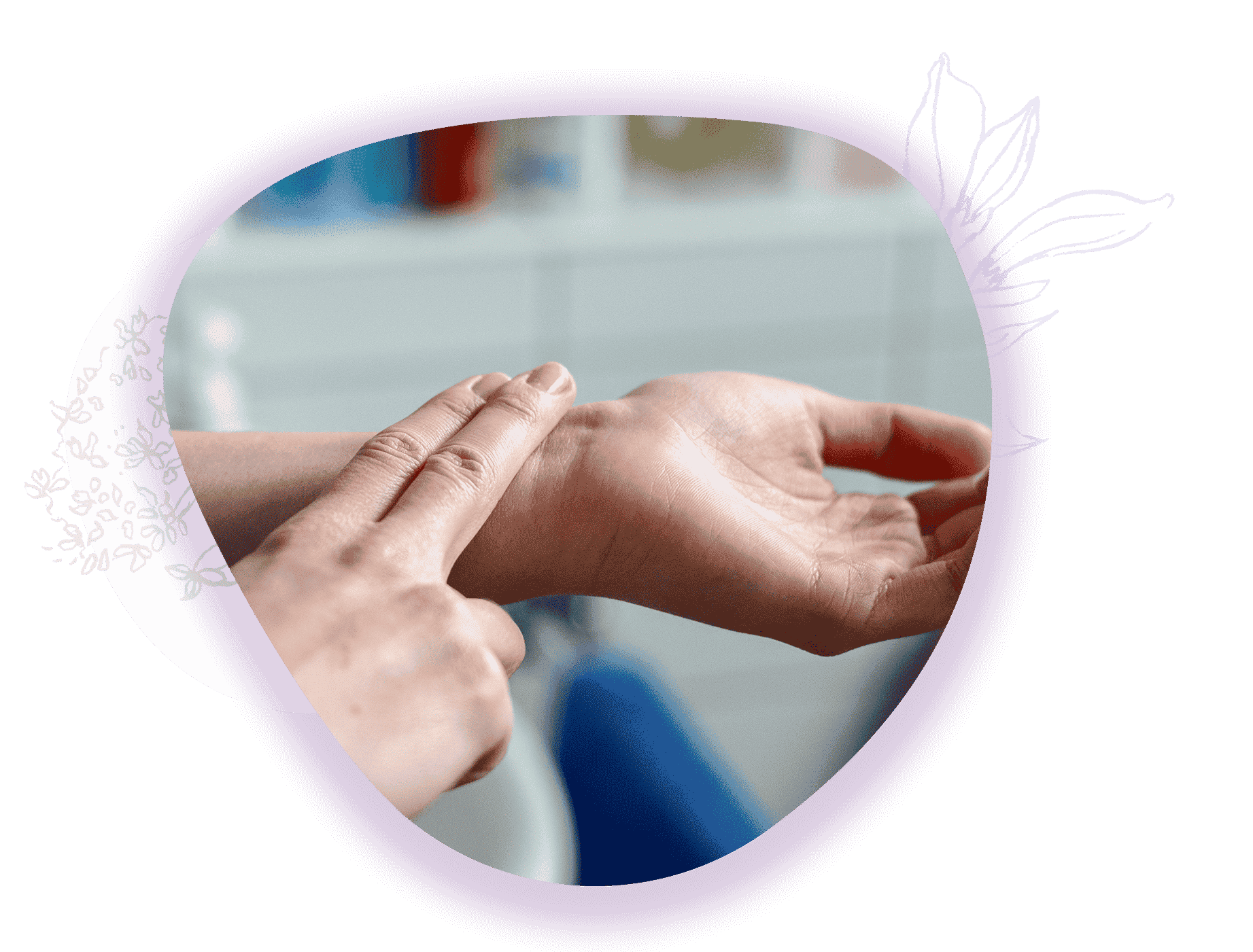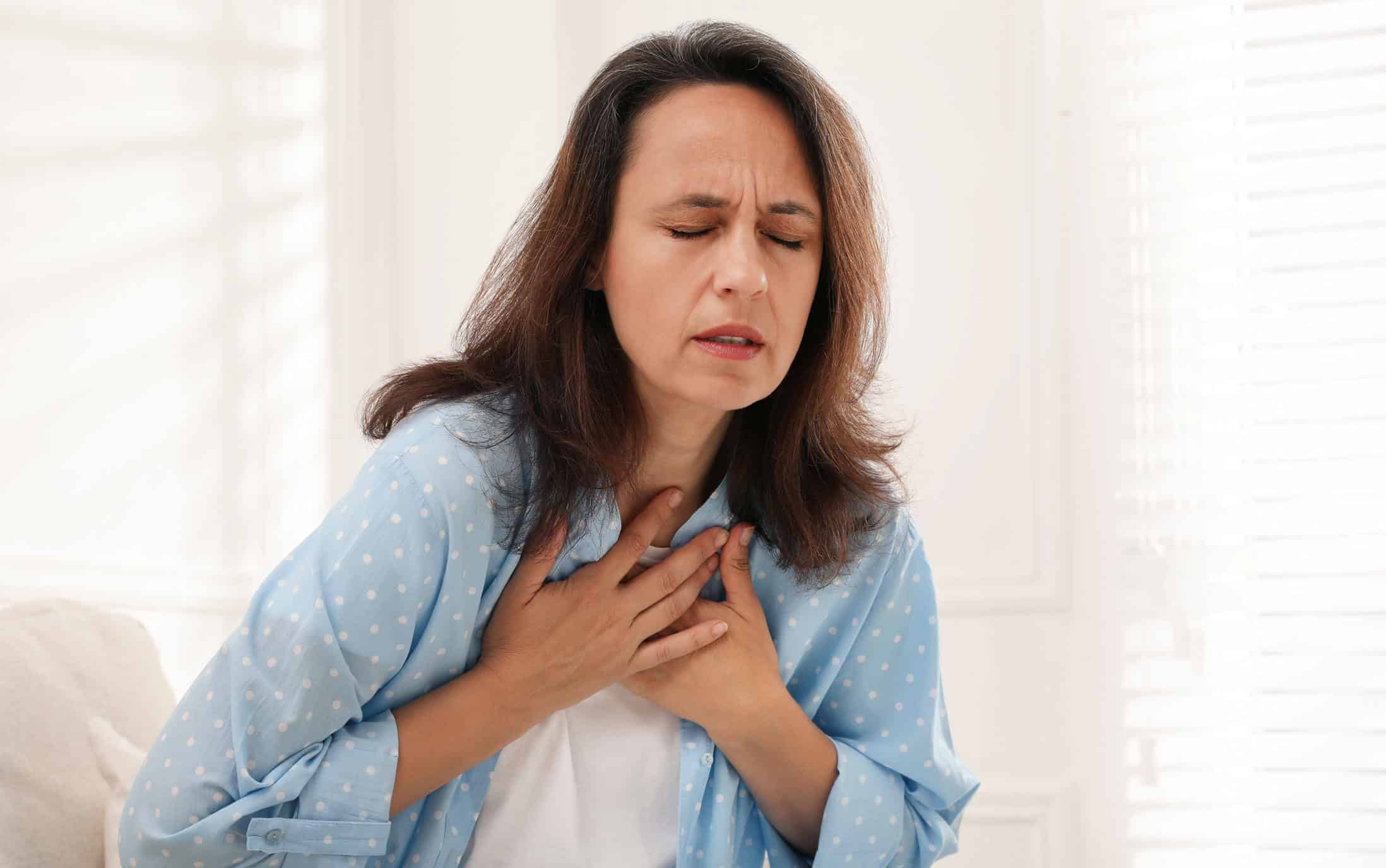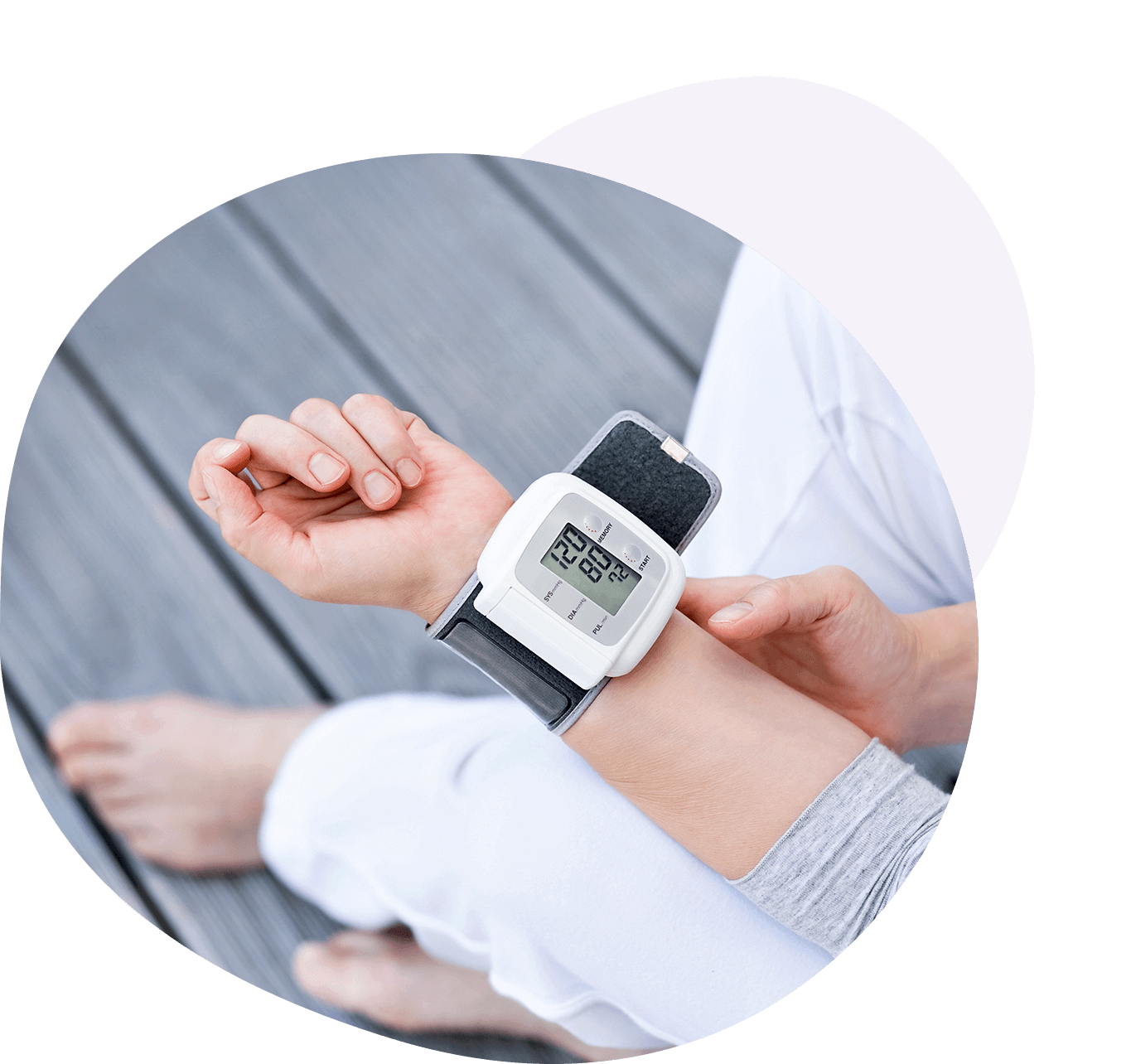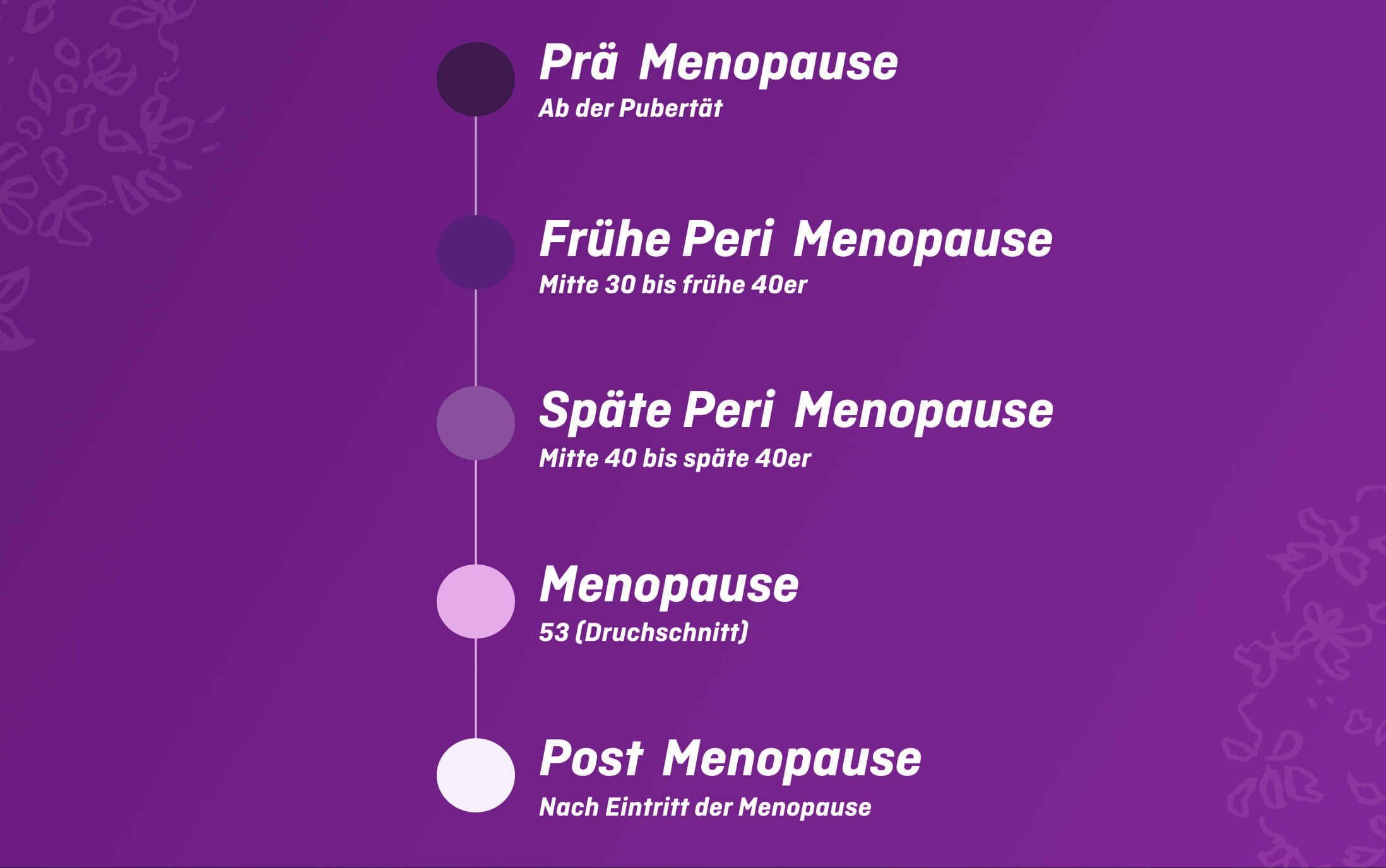Heart palpitations, irregular heartbeat and rapid heartbeat during the menopause
Your pulse abruptly accelerates, your heart starts racing or even starts skipping a beat. These are all symptoms that can occur in the context of the menopause.

Heart problems during the menopause: Signs and symptoms
Your pulse abruptly accelerates, your heart starts racing or even starts skipping a beat. These are all symptoms that can occur in the context of the menopause. This article will tell you more about what it means, when you urgently need to consult a doctor and what you can do to protect your heart during the menopause.

Whenever the heart starts skipping beats due to additional heartbeats, it loses its rhythm for a moment. Irregular heartbeats are referred to as extrasystoles in medical terminology, with the term ‘palpitation’ used to describe the phenomenon of an irregular heartbeat. Not only irregular heartbeats, but also a sudden acceleration in heart rate as far as rapid heartbeat, alco known as tachycardia, can be side effects of the menopause. Usually they occur abruptly during work, while shopping, at nighttime and even during rest. Heart palpitations, rapid heartbeat and irregular heartbeat during the menopause are symptoms that fortunately do not affect every woman.
However, there are also other causes that may be responsible for heart palpitations, rapid heartbeat and an excessively irregular heartbeat, such as drug and alcohol consumption, genetic disposition, overactive thyroid, coronary diseases or side effects of medication.
Heart problems during the menopause – What you need to know
Almost half of all menopausal women suffer from heart problems. Often, heart palpitations and rapid heartbeat occur in conjunction with hot flushes and are an manifestation of hormonal changes that generally take place over several years. Usually, complaints such as rapid heartbeat, irregular heartbeat and heart palpitations occur during the perimenopause or early postmenopause.
Around 40% of women develop heart problems such as heart palpitations, irregular heartbeat or rapid heartbeat during the menopause. Heart problems mainly occur during the perimenopause and early postmenopause.
The natural medicinal herb extract EstroG-100® alleviates numerous discomforts during the menopause and is highly effective against heart palpitations. Clinical studies have shown a reduction in the occurrence of these menopausal symptoms of 45%.

An interesting study by Indiana University
One current study by Indiana University in the US state of Indiana, published in the Journal of Women’s Health, reveals some interesting findings. There, a team of scientists investigated which women were particularly affected by these menopausal complaints.
For this purpose, data was evaluated from a total of 759 women aged between 42 and 62 who were suffering from rapid heartbeat, heart palpitations or irregular heartbeat. The body-mass index (BMI) along with indices and symptom diaries providing information about the severity of the impairment in the preceding weeks were also incorporated into the scientific survey.
It turned out that women with a higher BMI had lower complaints.
The following risk groups were also discovered: Women showing symptoms such as rapid heartbeat, irregular heartbeat and heart palpitations during the menopause suffer from depressive moods more often. They have an elevated perception of stress, often suffer from sleeplessness and on the whole, experience a poorer quality of life during the menopause.
Sheng, Y. et al. Effect of menopausal symptom treatment options on palpitations. Journal of Women’s Health. Apr 2021. 533–538.
Heart problems during the menopause
The question is, why do symptoms such as rapid heartbeat, irregular heartbeat and heart palpitations increase during the menopause? In general, women suffer from cardiovascular problems more rarely than men before the menopause. The protective effect of the oestrogen is one reason cited for the lower frequency of cardiovascular diseases. Due to the decline of oestrogen during the menopause, this protection levels off, causing the risk of cardiovascular diseases to increase. More recent findings, however, show that smoking also has a significant impact, i.e. due to the altered smoking behaviour of women over the last few decades, cardiovascular diseases have increased among women. A healthy and low-fat diet also plays a key role in protecting against cardiovascular diseases.
If rapid heartbeat occurs, the pulse rises. The pulse is a measure for heart frequency and indicates how often the heart beats. The pulse is measured while lying down or sitting and in an adult at rest, is usually between 60 and 80 beats a minute. People who are athletic usually have a lower resting heartrate.
You can easily find out your pulse yourself by placing two to three fingers at the artery of the inner wrist (beneath the ball of the thumb). Count the noticeable beats for the duration of 30 seconds and multiply the number by two.
Our tips for you
Irregular heartbeat, rapid heartbeat and heart palpitations can be reduced or prevented by strengthening your heart. In the tips below, find out what you can do to keep your heart healthy:
Healthy diet: Prepare meals with fresh ingredients where possible and keep your shopping basket heart-healthy. A Mediterranean diet with vegetables, fruit, nuts, seeds, healthy oils such as olive oil and fresh herbs is good for the heart.
Think about your meat consumption: If you must, then buy high-quality meat or even fish, consume as little meat as possible and avoid heavily processed meat products, such as meat spreads and sausage.
Change your seasoning habits: Replace cooking salt with herbal salt and use more spices and herbs instead of salt.
Reduce sugar consumption: Replace sugary drinks with tea or ginger water, milk chocolate with dark chocolate with a high cocoa content and avoid ready-made products.
Counteract stress with composure: Various relaxation techniques such as autogenic training and Jacobsen’s progressive muscle relaxation technique, as well as Qi Gong, Tai Chi and yoga can help.
Get active: Move a lot, such as by hiking, going for a brisk walk, cycling and swimming. Use the stairs instead of the lift for a change and if possible, leave the car at home.

Heart problems during the menopause: Prevention and treatment
Light, temporary heart palpitations and individual extrasystoles usually seen in the form of irregular heartbeat are usually harmless.
If you are suffering from rapid heartbeat, irregular heartbeat or heart palpitations, then it may help to make a few lifestyle changes. Increased alcohol, nicotine and caffeine consumption, stress and overtiredness due to too little sleep can have a negative impact on heart health.
Irregular heartbeat or disruptions to heart rhythm can be triggered by a deficiency in potassium and/or magnesium. Both minerals are needed to control the heartbeat and the heart’s pumping function.
Potassium is key for regulating blood pressure, for muscle work and for heart function. If a potassium deficiency (known as hypokalaemia) is identified, this can be balanced out using potassium preparations. With less severe potassium deficiencies, potassium can be supplemented via diet and can be found, among other things, in fruit (particularly bananas), vegetables, tomato purée, dried fruit, dark chocolate, in flour varieties such as wholegrain buckwheat, spelt and rye, along with in nuts.
Magnesium is known for being a muscle mineral, and therefore also has positive effects on the heart muscle and is effective against disruptions in heart rhythm. Sunflower seeds, wheat bran and pumpkin seeds, as well as nuts, oat flakes, bananas, Emmental, peas and bitter chocolate are rich in magnesium.
menoelle® and heart problems
Thanks to their holistic mode of action, menoelle® tablets are the means of choice for the effective, hormone-free and well-tolerated alleviation of menopausal symptoms, particularly if a classic or herbal hormone therapy is not possible or desired.
menoelle® tablets are also a reasonable alternative if other products are not effective enough or cannot be considered due to their risk of side effects or their restrictions of use.
Stockists
menoelle® menopause tablets can be purchased in dm, Rossmann, Müller, BUDNI and Globus branches.
menoelle® menopause tablets can also be purchased online at menoelle, aponow, dm, Rossmann, Müller, Amazon.
High blood pressure during the menopause
Often, problems such as heart palpitations go hand in hand with a rise in blood pressure. Your blood pressure should not exceed 135/85 mm Hg at rest. For values above this, a medical check-up is advised, as untreated high blood pressure poses a risk of complications.
Indications for elevated blood pressure include headaches or frequent nosebleeds. You should therefore check your blood pressure yourself regularly or have it measured at your doctor’s practice or pharmacy.

Menotest
menoelle®-menopause test
Am I already in the menopause or not yet?
Simply answer the 20 short questions in our menoelle® menopause test to know more straight away.






